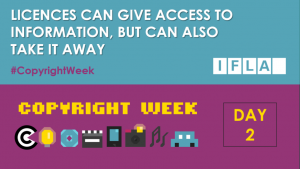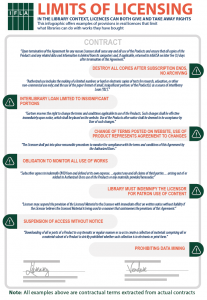 The limits established by licensing agreements are a major and growing concern for libraries. In an effort to underline the challenges raised, IFLA commissioned a literature review on the limits of licensing. The study, written by Svetlana Yakovleva, underlines that licences stop far short of granting ownership, and identifies the main limitations associated with copyright licenses for libraries.
The limits established by licensing agreements are a major and growing concern for libraries. In an effort to underline the challenges raised, IFLA commissioned a literature review on the limits of licensing. The study, written by Svetlana Yakovleva, underlines that licences stop far short of granting ownership, and identifies the main limitations associated with copyright licenses for libraries.
Some of the key issues referred to in the study are the following:
- You can’t licence without a licensor: in order to sign a licence, there needs to be someone who can offer it. In the case of orphan works (in particular works which were never made to be sold), it simply isn’t possible to identify and/or contact a rightholder. The fact that there may be many different “rightholders” in a single book or piece of music makes the problem worse.
- Licences can limit uses: as highlighted, licences can remove or weaken possibilities given to libraries and their users by limitations and exceptions to copyright. This can be explicit (contract terms which prohibit the making of copies for preservation or to adopt them for people with disabilities), or implicit (such as limiting use to certain “authorised” users means that supplying copies, even on an ad hoc basis, to others is ruled out).
- Licences do not offer guarantees: with licensed works often “stored” on the rightholder’s servers (rather than the library’s), there is often no guarantee that libraries can keep these works when their subscription ends, or they are made unavailable by the rightholder. Moreover, there is not necessarily any guarantee that the content has not (or will not) been changed
- Anti-piracy measures can become anti-user measures: digital resources often come with technological protection measures. These are used to enforce contractual provisions. While they may have a role in fighting piracy, they can also prevent users from benefitting from copyright exceptions, for example private copying, adding metadata, or preservation. Unless stated otherwise, such measures are protected themselves by law, and cannot be removed.
This infographic sets out real-life examples of the clauses that can limit the access and use of digital materials in libraries.

Is the full report available anywhere?
Hi Charles,
thank you for your comment. We have just added the link on the text of the post.
The full report is available here: https://www.ifla.org/node/11582.
Thanks!